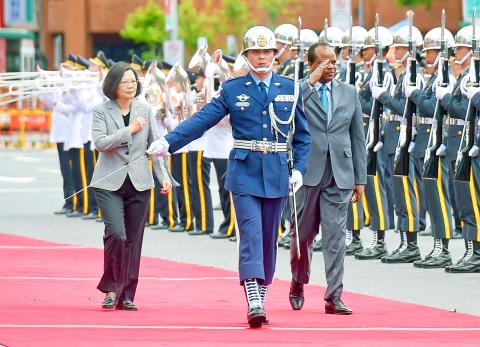King Mswati III of Eswatini yesterday pledged to be Taiwan’s friend in “good times and bad times,” as he witnessed the signing of an economic cooperation agreement by representatives of the two countries in Taipei.
The king made the remarks during his formal meeting with President Tsai Ing-wen (蔡英文) at the Presidential Office Building, a day after he joined Tsai to observe a portion of the annual Han Kuang military exercises in Taichung.
He arrived on a state visit to Taiwan on Wednesday and is scheduled to depart on Tuesday next week.

Photo: Huang Yao-cheng, Taipei Times
Having visited 17 times, the king said he is always warmly received by the Taiwanese government and its people, from whom he intends to learn, as his kingdom is in the process of transforming into a developed country.
Tsai’s administration has demonstrated itself to be an effective team that endeavors to communicate with the public about its policies, the king said.
Although Taiwan’s efforts to contribute to the international community have been restricted, he is confident that “the world will realize one day the things your country has contributed immensely to,” the king said.
He also pledged his allegiance to Taiwan amid reported efforts by China to poach Eswatini — Taiwan’s only remaining African diplomatic ally — before a summit of Chinese and African leaders in Beijing in September alst year.
Late last month, Burkina Faso severed ties with Taiwan and switched recognition to Beijing.
“Coming to our second home, I want to also make the commitment that whatever the challenges, we will always be together. You know we’re friends in good times and in bad times. We will always be friends,” the king said.
In her speech, Tsai expressed gratitude for Eswatini’s long-term support in the international arena.
“Despite the difficulties we face regarding international participation, we have never considered isolationism. We have pledged not to engage in a diplomatic bidding war [with China], but that does not mean we will isolate ourselves from the international community,” she said.
Taiwan has the capacity and the willingness to make a greater contribution to the world, Tsai said, adding that setbacks would only make her nation braver.
The agreement was inked by Minister of Economic Affairs Shen Jong-chin (沈榮津) and Swazi Minister of Commerce and Trade Jabulani Mabuza, with Tsai and the king acting as witnesses.
The agreement calls for stronger cooperation between Taiwan and Eswatini in the areas of economics, trade, technology, investment and environmental protection, and is designed to facilitate a mutually beneficial partnership and improve the welfare of both countries’ people, the Presidential Office said in a news release.

A preclearance service to facilitate entry for people traveling to select airports in Japan would be available from Thursday next week to Feb. 25 at Taiwan Taoyuan International Airport, Taoyuan International Airport Corp (TIAC) said on Tuesday. The service was first made available to Taiwanese travelers throughout the winter vacation of 2024 and during the Lunar New Year holiday. In addition to flights to the Japanese cities of Hakodate, Asahikawa, Akita, Sendai, Niigata, Okayama, Takamatsu, Kumamoto and Kagoshima, the service would be available to travelers to Kobe and Oita. The service can be accessed by passengers of 15 flight routes operated by

Chinese spouse and influencer Guan Guan’s (關關) residency permit has been revoked for repeatedly posting pro-China videos that threaten national security, the National Immigration Agency confirmed today. Guan Guan has said many controversial statements in her videos posted to Douyin (抖音), including “the red flag will soon be painted all over Taiwan” and “Taiwan is an inseparable part of China,” and expressing hope for expedited reunification. The agency last year received multiple reports alleging that Guan Guan had advocated for armed reunification. After verifying the reports, the agency last month issued a notice requiring her to appear and explain her actions. Guan

GIVE AND TAKE: Blood demand continues to rise each year, while fewer young donors are available due to the nation’s falling birthrate, a doctor said Blood donors can redeem points earned from donations to obtain limited edition Formosan black bear travel mugs, the Kaohsiung Blood Center said yesterday, as it announced a goal of stocking 20,000 units of blood prior to the Lunar New Year. The last month of the lunar year is National Blood Donation Month, when local centers seek to stockpile blood for use during the Lunar New Year holiday. The blood demand in southern Taiwan — including Tainan and Kaohsiung, as well as Chiayi, Pingtung, Penghu and Taitung counties — is about 2,000 units per day, the center said. The donation campaign aims to boost

The Central Weather Administration (CWA) said a magnitude 4.9 earthquake that struck off the coast of eastern Taiwan yesterday was an independent event and part of a stress-adjustment process. The earthquake occurred at 4:47pm, with its epicenter at sea about 45.4km south of Yilan County Hall at a depth of 5.9km, the CWA said. The quake's intensity, which gauges the actual effects of a temblor, was highest in several townships in Yilan and neighboring Hualien County, where it measured 4 on Taiwan's seven-tier intensity scale, the CWA said. Lin Po-yu (林柏佑), a division chief at the CWA's Seismological Center, told a news conference